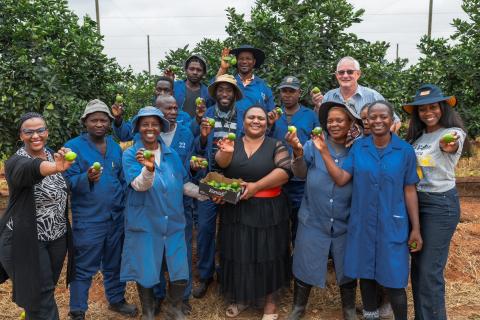
SAB offers government insight into the significance of the beer economy
In the run up to the National Budget Address by Minister of Finance Enoch Godongwana, the South African Breweries (SAB) gathered key members of media, industry and economists to unpack the state of the beer economy. Following the devastating impact of COVID-19 on the beer industry, this event was directed at the reappraisal of the beer economy; showcasing the role that beer plays in igniting the economy as well as unpacking SAB’s ask in advocating for fair taxation to provide for relief for the industry, with particular emphasis on SMME’s that depend on the beer value chain.
As the industry, and the country, anticipates another unwarranted rise in excise taxes, SAB gathered a diverse panel of industry leaders including an economist, the Beer Association of South Africa (BASA) and the National Liquor Traders Association to discuss how the government could better approach taxation.
Corporate Brand Director at SAB, Sphe Vundla opened the event by illustrating the significant role the beer industry plays in the South African economy. He said, “As one the largest brewers in Africa, SAB has a critical role in resuscitating the beer industry and supporting the country’s economic growth ambitions. Of significance to us is quantifying the impact that beer has on the economy, and advocating for those in our value chain, especially the SMME’s whose livelihoods have been directly impacted throughout the pandemic and lockdown restrictions placed on them.” As the first panellist of the day, SAB economist Fatsani Banda began the proceedings with an introduction to excise tax. She said, “While excise tax may be shrugged off as an inevitable fact of life, it is instructive that we need to step back and unpack the regime of excise taxes and the rationale for their existence.” In her address she urged the Minister of Finance to reconsider how excise is applied to the beer industry. “Applying above inflation increases in excise is neither beneficial to government, nor the beer industry”, she said. Banda further asked government to remember its own rhetoric about the importance of supporting small businesses through necessary policy interventions and practical action.
To elaborate on this point, Lucky Ntimane, Convener at the National Liquor Traders Association took to the podium to talk about the role of taverners and bottle stores in resuscitating the beer economy. “Our Minister of Finance recently requested public guidance regarding budget priorities for the following fiscal. We would suggest that he take heed of our president’s vision to support SMMEs by budgeting for reduced, or perhaps withdrawn, excise duty for the industries hardest hit by the pandemic.” Ntimane said this would allow these sectors to recover and grow, thereby stimulating the economy in general and providing many of the jobs lost as a result of the war against the pandemic. He went on to make an appeal to the Minister, in which he said, “It is only rational, fair, and intelligent, therefore, to focus government support on the SMMEs hardest hit by the pandemic.There is a simple solution to achieve the above rationality and support in the interests of the South African economy - reduce taxes upon the SMMEs hardest hit by the lock-downs.”
CEO of the Beer Association of South Africa (BASA), Patricia Pillay discussed the basics of beer economics. In her address, Pillay said, “Our impact is far-reaching where, more than just a consumable product sale, the beer industry has evolved and in turn motivated the establishment of local enterprise, entrepreneurial spirit, local innovation and a unique culture found only in South Africa.” Pillay quoted President Ramaphosa in his Economic Recovery Plan delivery in Parliament, where he said that local manufacturing is an important part of South Africa’s economic reconstruction and recovery plan.
She then used this callout to point to the fact that SAB, the country’s largest brewery, sources almost 100% of all its raw materials locally where they have radically helped to strengthen the local economy. In her address, Pillay took the Finance Minister up on his offer to provide tips for his inaugural budget address, in which she offered four tips.
- Many countries in the world support a sliding scale on excise tax based on the beverage type and alcohol strength, and we propose South Africa does the same.
- If consumers are once again plagued with additional taxes, they will be tempted to look for cheaper alternatives like illicit alcohol.
- Any increase above inflation in excise tax will be the final nail in the coffin for many businesses across the beer value chain.
- Any above inflation increase in excise would be going against government’s own policy guidelines, only discouraging the investment community at a time where we need them most.
To close off proceedings, SAB’s economist Fatsani Banda offered SAB’s suggestion to government on how it should approach excise tax. She said, that government should keep excise adjustment at or below inflation, in order to support to recovery of the sector.



